A Consumer Guide to the Trailing Edge: December, 2011
Recycled Goods (#92)
by Tom Hull
Feels like a short month, but comes out close to the year's median -- much better than 8 in January, 13 in September, 14 in March. Working opportunistically, recycling four titles from Jazz Prospecting, happy I could beg a copy of the McGarrigles. Other than that, most of the titles come from exploring back the catalogs of Jay-Z, Mates of State, and Wussy -- all tips from Robert Christgau's Expert Witness, something Rhapsody is especially useful for. The spottiness is because I'm filling in things I hadn't heard while skipping known titles. These don't have anything to do with reissues, but it seemed to make more sense to file them here than to mix up the new release focus of Rhapsody Streamnotes. On the other hand, without getting physical product I'm letting most of the real reissues slide by -- especially the seasonal boxes, which seem like too much to swallow via Rhapsody, and packaging matters most.
I still miss the old Recycled Goods, and don't doubt that given access and time one could return to form. On the other hand, a lot of what I see in the metacritic file isn't very inspiring. I could see sorting through reissues of artist I never cared much for -- like Nick Cave, Mickey Newbury, Queen, Thin Lizzy -- but I find the anniversary megapadding attached to the likes of REM, U2, and Nirvana singularly uninteresting. Then there are the cut-down compos like Universal's Icons and Sony's Playlist that either overtrim worthwhile artists or overpad worthless ones. There's Sony's recent penchant for cheaply boxing up the collected works of artists with a few essential albums and a lot of superfluous ones. On the other hand, I do sometimes run across things of real interest, and there is more I would be happy to do if I could.
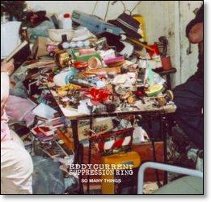 |
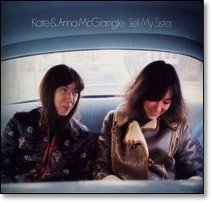 |
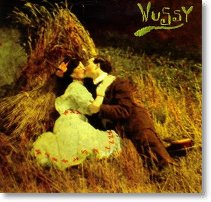 |
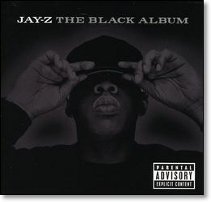 |
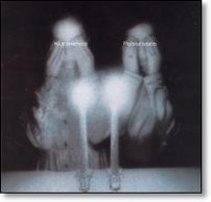 |
The Dave Brubeck Quartet: Last Time Out: December 26, 1967 (1967 [2011], Columbia/Legacy, 2CD): Unofficial tape, probably off the soundboard, found in a closet and dusted off. Brubeck had announced his brief retirement to start at the end of 1967, but in most regards this just extended the hundred-plus concerts the Quartet had given during the year. A long running, immensely popular group, With Paul Desmond, the alto saxophonist who had given the Quartet its signature sound since 1951, drummer Joe Morello and bassist Eugene Wright, who had joined in 1956 and 1958 respectively. Lots of interesting stuff, ending in a "Take Five" that leaps right off the stage. B+(***)
Eddy Current Suppression Ring: So Many Things (2003-04 [2011], Goner): Odds and sods collection from an Australian punk band first championed by a fortuitously flattered Chuck Eddy -- I always figured a piece of esoteric electronics, but further research indicates that the guitarist is named Eddy Current and the singer is Brendan Suppression. (The bassist is accurately Rob Solid, the drummer Danny Current.) They got the basic sound perfect from the start, and stick close for the two years of thrashing here -- 22 songs, 71:29, only two covers, including a winning "We Got the Beat." A- [R]
Gorillaz: The Singles Collection 2001-2011 (2001-11 [2011], Virgin): Virtual hip-hop group, where Jamie Hewlett's graphics front for a pool of not-quite-anonymous music talents -- Dan Nakamura, Damon Albarn, Miho Hatori, Tina Weymouth, Chris Frantz, and various others (although Wikipedia only lists Albarn and Hewlett). Whenever I've sampled their five albums plus ephemera they seemed vacuous, but suitably concentrated they are tolerably amusing -- especially when I flash back on Dan the Automator, the main talent wasted here. B+(*) [R]
Jay-Z: The Hits Collection, Volume One (1998-2009 [2010], Def Jam/Roc Nation): Third or fourth such compilation, all promising more volumes, no second volumes yet. I count five top-10s here, including features for Beyoncé, Alicia Keys, Kanye West and Rihanna, so only two of his own leads -- "Izzo (HOVA)" and "Show Me What You Got" -- but he's an album guy: three cuts each from The Black Album and The Blueprint 3; none from his striking debut. Some stuff I'd pick, some I'd skip, leans harder than I'd like on the noise -- someone must think those are party anthems. B+(**) [R]
Kate & Anna McGarrigle: Tell My Sister (1971-77 [2011], Nonesuch, 3CD): Canadian folk singers, sisters, sing the occasional song in French (and absolutely charming when they do). They swoon when they hear that southern drawl, like to talk about the times they got laid, and have a special fondness for swimming nude. Their first two albums were high points of my first two years in New York, cracking year-end lists dominated by the punk revival because they were so exceptional, also so comfortable -- my affair with gospel peaked with "Traveling on for Jesus." Those two albums are here, both as solid-A as ever, plus a third disc of earlier demos: sparer but hardly rougher takes of songs that appeared on the debut, two takes of "Heart Like a Wheel" (which Linda Ronstadt snapped up and turned into a hit), five ones that got lost. Less essential, of course, but chances are when you pull this package off the shelf it's the one you'll wind up playing. A
John Surman: Flashpoint: NDR Workshop - April '69 (1969 [2011], Cuneiform, CD+DVD): The middle of a very rich period for the 25-year-old soprano/baritone saxophonist, coming out of Mike Westbrook's group, leading The Trio (with Barre Phillips and Stu Martin), his first album under his own name just out and his big band Tales of the Algonquin in the near future, and (this and) other projects falling through the cracks. His NDR workshop assembled four reeds (Surman, Alan Skidmore on tenor sax and flute, Ronnie Scott on tenor sax, Mike Osborne on alto sax), Kenny Wheeler (trumpet, flugelhorn), two trombones (Malcolm Griffiths and Eric Kleinschuefer), piano (Fritz Pauer), bass (Harry Miller), and drums (Alan Jackson). Five pieces: the two featuring Surman's soprano are irresistible vamps, as is the closer after they get past their everyone-raise-hell patch at the beginning. The slower pieces have more trouble gaining traction, although there are crackling solos here and there. The DVD is a straight b&w take of the album -- probably a rehearsal but close to the final mark. B+(***)
Wussy: Funeral Dress (2005, Shake It): The first of five Christgau-rated grade A albums, a level of affection that cannot be gleaned from one or two or probably a half-dozen plays, in that it must be personal because it sure isn't formal. Chuck Cleaver was in a 1990-2000 group called the Ass Ponys, producing moderately catchy, somewhat grungy alt-rock. Lisa Walker joins him as a second, but by no means second, guitar, voice, and brain, plus they have a bassist who plays more than that and a drummer who hangs in there. I've sampled a couple of their later records, admired them respectfully without ever feeling the need to get engaged. Probably would have helped had I started here, mostly because Walker is so much more out front, but either way they take a lot of work. I'm told they're worth it. A- [R]
Briefly Noted
Jaki Byard: A Matter of Black and White: Live at the Keystone Korner, Vol. 2 (1978-79, High Note): Solo piano, well-worn standards -- "God Bless the Child," "Alexander's Ragtime Band," "Do You Know What It Means to Miss New Orleans," "I Know a Place," "'Round Midnight," "Day Dream," among others -- bright and touching. B+(***)
El Rego: El Rego (1966-70s [2011], Daptone): Singles cut from 1966 on into the early 1970s by Theophile Do Rego, a James Brown wannabe from Dahomey born in 1936; this compilation puts him close the the roots of Afro-funk while still working in song forms with only one crossing the 4-minute mark. B+(**) [R]
Kali Z. Fasteau: Prophecy (1990-92 [2011], Flying Note): World traveler, avant-garde gadfly, widow of a clarinet player connected to Coltrane's late work, plays a dozen odd instruments -- sheng, ney, and mizmar are conspicuous here -- vigorously if not always expertly, and sings more than a little -- exuberantly if not all that listenably, with a cast of eight, most notably bassist William Parker. B
Kali Z. Fasteau/William Parker/Cindy Blackman: An Alternative Universe (1991-92 [2011], Flying Note): From the same period as Prophecy, but Fasteau limits herself to rotating pieces on three instruments (cello, soprano sax, electric piano, with no vocals); the cello emerges stealthily from Parker's bass, the soprano squawks wild and free, and the piano reduced to toy percussion, something the others can adds twists to. B+(**)
Jay-Z: Reasonable Doubt (1996, Roc-A-Fella): First shot, hard and cold, a discipline that would work for him even when he's sliding, which this being his first shot he dares not do; the spare beats conserve budget and set him off, rarely forcing a rhyme, gradually building to a stride where he takes delight in his label name, rubbing your nose in it. A- [R]
Jay-Z: In My Lifetime, Vol. 1 (1997, Roc-A-Fella): Second album, first of three numbered volumes, showcases his business acumen starting with his insights into how the rap game matches up with the crack game; beats steady, not flashy, even when enveloped in background vocals and stray gunshots he keeps it simple -- his preferred term may be real. B+(***) [R]
Jay-Z: Vol. 2 . . . Hard Knock Life (1998, Roc-A-Fella): Third album: title cut isn't a joke but is a bit too cute; beyond that his business sense moves from analogies between crack and rap toward mining the former for material, a sign of desperation or compacency -- couldn't just be laziness; looks sharp on the cover, his hard knocks clearly behind him. B+(**) [R]
Jay-Z: The Blueprint 2: The Gift and the Curse (2002, Roc-A-Fella): Having never warmed to Z's 2001 The Blueprint, I have no recollection of what this sequel's relationship is, but I suspect the gift is Z's talent for credible flow and the curse is the need to keep fresh product rolling off the assembly line; still, the sheer length is impressive, even achieved by force, more rapid fire than when he was coming up, but less wasted ammo. B+(**) [R]
Jay-Z: The Black Album (2003, Roc-A-Fella): Concise and to the point for once, with a story line that brings him from a painless ten pounds to the top of the rap game, the life he chose, not that chose him; strangely enough, when this came out I only heard him over Danger Mouse's Beatles rips, but given the choice I'd take Z's crack beats in a moment. A- [R]
Jay-Z: Kingdom Come (2006, Roc-A-Fella): Bumped up to Def Jam CEO, nominally retired -- barely raising a blip in his discography, or a speed up if you count joint efforts with Linkin Park and R. Kelly -- not that he has much riding on this; on the other hand, post-Katrina, he has things to weight in on. B+(**) [R]
The Klezmatics: Possessed (1997, Xenophile): Where Rhythm and Jews and Jews With Horns announced their presence boldly (and baldly, or do I mean humourously?), this postmodern klezmer band's fourth album was their breakthrough, combining the form with the sense that they (or at least vocalist Lorin Sklamberg) have something new to say -- even when they fall back into Yiddish, or perhaps especially. A-
The Klezmatics: Brother Moses Smote the Water (2004 [2005], Piranha): Looking for the klezmer group's recent Live at Town Hall, I stumbled across this "Live in Berlin" special with black Jewish gospel singer Joshua Nelson and fellow traveler Kathryn Farmer providing a robust gospel fusion on old testament anthems -- all trad. except for the one by Sam Cooke; I'd prefer less fire and brimstone, and for that matter more Yiddish. B [R]
Mates of State: Team Boo (2003, Polyvinyl): Husband/wife group, Kori Gardner on keybs, Jason Hammel on drums, both sing; met in Lawrence, KS in 1997, and moved to San Francisco the following year, with seven albums since then; this early one catches them at their cheesiest, lots of organ, songs about what it takes to get through the night. B+(*) [R]
Mates of State: Re-Arrange Us (2008, Barsuk): Songcraft much improved, both structure and hooks, and the piano adds stature where the organ merely kicked it along; upbeat, suspiciously happy, not least with each other; don't know why I don't find them more appealing -- perhaps a bit too bulked up. B+(**) [R]
Wussy: Rigor Mortis (2008, Shake It, EP): Four studio cuts plus three live ones, the title cut appearing twice, adds up to 24:44; dense and relatively hard for me to follow, but the energy is palpable, as are the "blood and guts." B+(**) [R]
Legend: B+ records are divided into three levels, where more * is better. [R] indicates record was reviewed using a stream from Rhapsody. The biggest caveat there is that the packaging and documentation hasn't been inspected or considered, and documentation is especially important for reissues. But also my exposure to streamed records is briefer and more limited, so I'm more prone to snap judgments -- although that's always a risk.
For this column and the previous 91, see the archive.
Additional Consumer News
Copyright © 2011 Tom Hull.